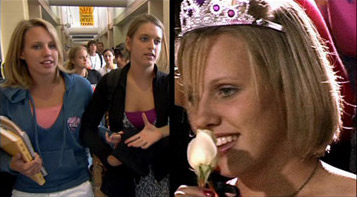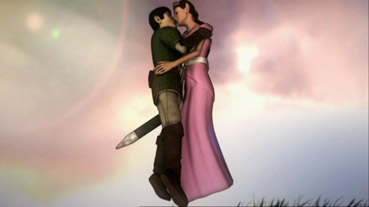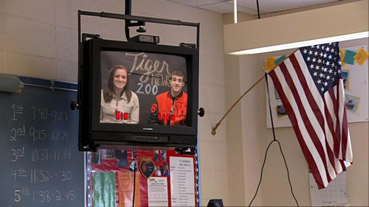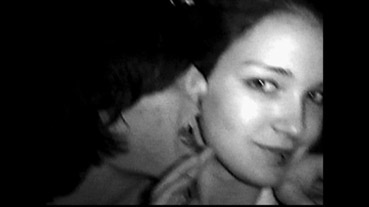| |
"I do not ask to be taken to Jupiter or the ends of the earth [...] But I do ask [for] a modicum of revelation." |
| |
John Grierson, 'What I Look For,' in
The Founding Principles of Documentary, 1981. |
| |
|
| |
"I want people to remember me when I die. I don't wanna have just lived for nothing." |
| |
Hannah Bailey, American Teen, 2008. |
When I first saw the trailer for Nanette Burstein's American Teen on Youtube last year, it managed to simultaneously pique my interest and leave me feeling confused all at once. Why? Because I had no idea what kind of film it was trying to be. Until almost near its very end, I thought it was a teen film, albeit with an err toward mumblecore, or the quasi realist style common to Larry Clarke and Harmony Korrine films. Then, it came to me, amongst the pop music, less than subtle allusions to John Hughes' The Breakfast Club, snappy quotes professing immense enjoyment and intertitles blowing the trumpet of Sundance success: it was a documentary, but a very different one. In a film culture climate where genre film is less a pure distilled formula and more a cooked up compound of ever-increasing elements – which sees films such as Edgar Wright's Shaun of the Dead being termed a "rom-zom-com" (a romantic zombie comedy), my confusion could be forgiven. Of course, this hybridity is partly down to the evolution of genre – nothing can stay the same – and partly down to the fact we live in a postmodern culture, where the notion that can art forms can be created without being full of Tarentino-like derivative references is exactly that, a notion.

After briefly lamenting the thought that being born in the 1980s meant that almost all had been said and done in regard to filmmaking, I realised that my thoughts were similar to the stylistic shift within the documentary form itself – it was no longer pure, and had moved away from the rulebook set down by its founding father, John Grierson. For some, Burstein's film is typical of the perception that the documentary is being 'dumbed down,' either to fit in with the 'hot-button' headline-grabbing films like Michael Moore's Bowling for Columbine and Morgan Spurlock's Supersize Me or to replicate the soap opera allure of MTV reality shows, such as The Hills and The Real World. In the case of American Teen, while such shows could be considered its closest counterpart, to pigeon-hole it as glossy or shallow as the aforementioned docusoaps would be an easy and incredibly cheap shot. It might feel like a documentary by numbers, there is here than meets the eye.
American Teen is Burstein's second film, coming six years after 2002's critically-acclaimed The Kid Stays in the Picture (co-directed with Brett Morgan), an exploration of the infamous Paramount producer, Robert Evans. However, this film saw Burstein reflect upon her own past, and her love of teen films helmed by John Hughes and his peers. Feeling that their modern equivalents failed to meet that high, and oft missed benchmark, she set out on a project of her own. Instead of opting to make a fiction film, she chose documentary, hoping that she could find similar themes and material in the real life of modern teens, sensing that, and the scope of the medium would allow her the depth of exploration and complexity she desired. After an initial casting call, and a series of interviews with several schools, she settled upon one, and cut down her initial participant list from fifteen students, to the final five of Hannah Bailey, Mitch Reinholt, Jake Tusing, Megan Krizmanich and Colin Clemens.
The film follows their final year at Warsaw Community High School, in Warsaw, Indiana. Throughout the year, each face their own personal struggles as they try to figure out who they are, their future aspirations and their place in the world. Hannah (the rebel) wishes to go to college in San Francisco and escape the conservative attitudes of Warsaw. Mitch (the heartthrob) wants to strike out and assert himself within his popular group of friends, while Jake (the geek), just wants to fit in and find love. Colin (the jock) plays out his basketball season with the added burden of performing for college scouts in order to obtain a scholarship or face a stint in the Army. While Megan (the princess), has a burden of another kind, as she waits for her acceptance letter to the prestigious Notre Dame University, eager to follow in the footsteps of her father and siblings.

Though the themes of the film are well-trodden ones, what sets American Teen apart is its approach and distinctive aesthetic. Rather than having a single, unified style, the film incorporates the filmic equivalent of a patchwork quilt. Alongside traditional observational filming, Burstein uses a variety of media to represent the students' world, using everything from stylised cartoons to Youtube-like handheld camera footage and split screen framing. The animation sequences are particularly striking, effectively implemented to represent the students dreams and future aspirations, each rendered to reflect their interests and personalities. Such attention to detail actually enhances the experience of watching the film. For Megan, her vision of Notre Dame looks something like social networking platform, Second Life, whereas Colin's dreams of pro-Basketball glory are in manga-like in monochrome and red. In complete contrast are the imaginings of Jake and Hannah. Jake's fantasy of winning the heart of his crush, Lauren, and then taking on love rival Mike are rendered in CGI, styled upon the adventure games he enjoys playing in his spare time, reminiscent of the computer graphics and live action footage in Nic Balthazar's Ben X. Artistic influences are strongest in the Hannah's dream-cum-nightmare, where she struggles with depression after a break-up, itself exacerbated by her fears of inheriting her mother's mental illness, which is brought to life with dark, Tim Burton-esque puppet-like animation.
During these sequences, Burstein not only accurately reflects their lives – it's easy to imagine the entire film being made and cut together by aspiring filmmaker Hannah herself – but she also dares us to ask a simple yet complex question: what is documentary? Though it may deviate wildly from documentary's roots, in breaking these rules, Burstein makes new ones, interacting with, and presenting her subjects in a way that makes the film all the more intriguing, enjoyable and perhaps most importantly of all, accessible. Is this a concerted effort to break documentary's own stereotype, which paints it as boring, staid and unappealing? If altering the form to make it more akin to teen drama than the work of Grierson, Robert Flaherty and Frederic Wiseman means Burstein's work actually reaches more people, then surely these are positive and not negative changes?
As with any documentary film, Burstein and her participants found themselves under scrutiny, with audiences and critics raising concerns regarding the film's authenticity. In one article the director admits that elements of the film were occasionally scripted, sometimes staged, alerted by her participants when 'something big was about to happen,' and in others, her participants have refuted the similar claims. Contrivance within the genre is a Pandora's Box of debate on its own, but ultimately, does how the material was obtained need to overshadow its meaning and what we gain from it as viewers? The line between fact and fiction has always been a fine and constantly blurring one. From the moment a documentary filmmaker sets out on a project, conscious and sometimes unconscious choices are made in regard to location, subject and theme, which all contribute to create some form of bias, be it stylistic or editorial. In light of this, to deride Burstein for openly seeking teens which fit certain tropes, and editing their stories to give the film a sense of narrative shape is unfair. Her teenage subjects are in a better position than most to assess whether they are being cheated. They are a product of the reality television environment; a culture where levels of privacy are different and cameras are a constant presence, seen less as an invasion of privacy and more as a mode of expression.

Amidst the teen drama of romantic entanglements, game successes and failures, and revenge pranks gone wrong, American Teen reveals genuine truths, which break down the archetypes created to market the film in more ways than one. In its quietest, most reflective and emotionally heartfelt moments Hannah, Mitch, Jake, Megan and Colin prove that they are much more than just a rebel, heartthrob, geek, princess and jock. And just like real life, Burstein's film is paced to reflect it, from its dizzy highs to the lowest of lows. The end result is an intimate, vibrant and evocative snapshot of modern teenage life, which has the capacity to breathe much-needed new energy into the documentary genre.
American Teen was shot on video and has made no attempt to hide this, but given the medium's long-standing popularity with documentary filmmakers this is never an issue and if anything helps keep the genre ties solid even during experimentations with form and style. The picture sharpness suggests either HD or high-band analogue as the medium of choice, but the contrast is consistently good and and the black levels excellent, and there is little of the loss shadow or highlight detail you tend to associate with video shooting. The aspect ratio is 1.78:1 and the picture is anamorphically enhanced.
The Dolby 2.0 stereo track does the documentary job, with clear dialogue recording and very good music reproduction.
The extras on this disc from Optimum Releasing are lighter than I had expected, containing two interview featurettes and a trailer.
Unfortunately, the interviews are relatively short, most likely edited down from lengthier footage. Each one is segmented with intertitles showing the relevant question followed by the answers of Bailey and Krizmanich in the first featurette, an Interview with Megan Krizmanich and Hannah Bailey (1:49); and Reinholt, Tusing and Clemens in the second, an Interview with Mitch Reinholt, Jake Tusing and Colin Clemens (2:30). Across both features, the groups discuss the genesis of the film, encompassing the initial selection stages to the reception of the film by their friends and family. Alongside this are more personal reflections upon their relationships before and after the documentary's production, as well as what they have taken from the experience.

Lastly, the trailer (2:37) is a snappily edited piece, which neatly sets up both the major themes of the film and its branding of Burstein's student participants as jock, rebel, princess, heartthrob and geek respectively, which works as an effective little aide de memoir when seeing the film for the first time, making it easy to connect and identify with each person - presumably part of the reasoning behind it.
While the featurettes were interesting to view – partly from the pure novelty aspect of seeing the group of teens since the making of the documentary – the disc is let down by the notable lack of Burstein's presence on the extra features in any form. A commentary track by the director or indeed an interview would have given some much needed insight into the genesis of the project and most importantly, her perspective on the material. The fact it lacks an authorial (or adult) voice may simply be down to the fact that Burstein wishes to retain some anonymity, keeping some semblance of documentarist tradition in an era where the documentary filmmaker's persona often takes precedence over that of their subject. What seems more likely, however, is that the film's marketing by Paramount Vantage and A & E IndieFilms, which is on the one hand, a great asset and on the other, a detrimental influence. The pressure of this influence is especially clear in the trailer and 'character' teaser for each of the students (unfortunately these are absent from the region two release, but can be found on the region one version).
American Teen is an interesting, often insightful and visually innovative documentary which raises important questions about the style and content of the documentary form. For those unfamiliar with the genre – whether through lack of interest or lack of knowledge - its accessible presentation has the potential to change their perspective and allow them to broaden their viewing habits. While this film is a different kind of documentary than those of John Grierson or Frederic Wiseman, it is not any less valid and should not be dismissed as an example of the 'dumbing down' of the form. If anything, it is exemplary of how far the genre has evolved since its formative years, shaped by the work of the Lumière brothers and Georges Méliès. Most importantly, it shows that documentary has a capacity to extend beyond the boundaries of its obersvationalist traditions. After all, rules are made to be broken. The result onscreen looks less like a documentary and more like a feature film. Sold as a hybrid of popular MTV reality shows with a knowing nod toward the work of John Hughes brat pack teen films, this amalgam cleverly trades on the current vogue for the reality genre and the reflected nostalgia of Hughes' work, and stirs collective memories of the high school experience. While it may mean that the potential audience for Burstein's film expands beyond the norm – which can only be good for documentary filmmaking, and the industry in these times of economic uncertainty, it does come at a price. I do hope that in light the film's success, that Burstein chooses to re-release a DVD with this extra material. It would bring an added richness to an already impressive addition to modern documentary cinema.
|